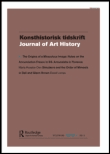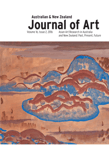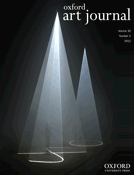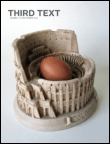
RIHA Journal
Scope & Guideline
Pioneering research in the visual and performing arts.
Introduction
Aims and Scopes
- Interdisciplinary Exploration of Art and Culture:
The journal emphasizes the intersection of various disciplines such as art history, cultural studies, and sociology, providing a platform for diverse methodologies in understanding art and its societal impacts. - Focus on World's Fairs and International Exhibitions:
A core area of the journal is the analysis of world's fairs and international exhibitions, exploring their role in shaping cultural narratives and their implications for colonial and postcolonial discourse. - Colonial and Postcolonial Studies in Art:
The journal contributes significantly to the discourse on colonialism and postcolonialism, examining how art and exhibitions reflect and shape these historical narratives. - Gender Studies in Art History:
A consistent theme is the examination of gender dynamics within art and exhibitions, particularly how gender representation has evolved in connection with historical events like world's fairs. - Historical Contextualization of Art Objects:
The journal places importance on the historical provenance and contextualization of art objects, particularly in relation to their cultural and political significance.
Trending and Emerging
- Decolonization of Art History:
A significant trend is the increasing focus on decolonization within art history, examining how colonial histories impact contemporary practices and representations in art. - Gender and Representation:
There is a growing emphasis on gender studies, particularly in relation to how gender shapes artistic expression and representation in exhibitions, with an exploration of feminist perspectives. - Impact of Technology on Art:
Recent publications indicate a rising interest in the relationship between technology and art, particularly how digital platforms and new media are transforming artistic practices and audience engagement. - Cultural Memory and Heritage:
An emerging theme involves the exploration of cultural memory and heritage, focusing on how art serves as a medium for remembering and interpreting historical narratives, particularly in postcolonial contexts.
Declining or Waning
- Traditional Art Historical Methods:
There appears to be a waning interest in conventional methodologies of art history that do not incorporate interdisciplinary approaches, reflecting a move towards more integrated and holistic analyses. - Focus on Individual Artists:
Research centered exclusively on individual artists, without considering broader cultural or social contexts, has decreased, indicating a shift towards collective and contextual studies. - Eurocentric Perspectives in Art:
There is a noticeable decline in papers that solely focus on European art without addressing global interconnections, as the journal increasingly emphasizes diverse and inclusive narratives.
Similar Journals

KONSTHISTORISK TIDSKRIFT
Illuminating the Intersections of Art and CultureKONSTHISTORISK TIDSKRIFT is a distinguished journal dedicated to the exploration of art history and its intersections with visual and performing arts. Published by Routledge Journals, Taylor & Francis Ltd, this esteemed publication has been a vital resource for scholars and professionals alike since its inception in 1932, with a mission to advance the understanding of historical and contemporary artistic expression. Operating from the United Kingdom, it currently occupies a commendable Q3 Quartile ranking in both History and Visual Arts and Performing Arts categories for 2023, according to Scopus metrics. With an engaging array of peer-reviewed articles, the journal serves as a platform for critical discourse, fostering an inclusive intellectual community. As it looks ahead to its convergence into 2024, KONSTHISTORISK TIDSKRIFT promises to enrich the academic landscape with impactful research and insights, making it a vital resource for researchers, professionals, and students passionate about the field.

Umeni-Art
Innovating Perspectives on Contemporary Artistic PracticesUmeni-Art is a prominent journal in the field of visual arts and performing arts, published by the Institute of Art History, Academy of Sciences, Czech Republic. With its ISSN 0049-5123 and E-ISSN 1804-6509, the journal has established itself as a critical platform for scholarly discourse and artistic expression since its inception in 2002. Although currently classified in Q4 within the Arts and Humanities category, it aims to elevate the understanding and appreciation of the arts through rigorous research and innovative perspectives. The journal's Scopus ranking places it at Rank #573/667, reflecting its growing contribution to the field and expanding reach within the artistic community. With a focus on fostering collaboration among researchers, practitioners, and students, Umeni-Art seeks to enrich the academic landscape with significant findings and discussions that inspire future research and creative endeavors. While it does not offer open access, the journal remains a valuable resource for those vested in exploring the dynamic interplay between art, culture, and society in the contemporary context.

MITTEILUNGEN DES KUNSTHISTORISCHEN INSTITUTES IN FLORENZ
Bridging disciplines through critical insights in the arts.MITTEILUNGEN DES KUNSTHISTORISCHEN INSTITUTES IN FLORENZ, published by LIBRERIA SALIMBENI, is a prestigious journal based in Germany that serves as a vital resource for scholars and practitioners in the fields of history, visual arts, and performing arts. With an ISSN of 0342-1201, this journal reflects significant academic excellence, as evidenced by its Scopus rankings, placing it in the second quartile (Q2) for both History and Visual Arts and Performing Arts in 2023. The journal covers a broad scope from 2002 to 2010 and from 2013 to 2023, focusing on interdisciplinary studies that bridge historical context with contemporary artistic practices. Although not open access, MITTEILUNGEN continues to contribute important insights and critical discourse, making it an essential read for researchers, professionals, and students committed to advancing knowledge in these dynamic fields.

Experiment-A Journal of Russian Culture
Celebrating the Diversity of Russian Cultural ExpressionsExperiment-A Journal of Russian Culture is a distinctive publication dedicated to exploring the multifaceted dimensions of Russian culture, encompassing literature, art, and social history. Published by BRILL, a respected name in academic publishing, this journal provides a platform for original research and insightful discourse, fostering a deeper understanding of Russia's rich cultural heritage. With an ISSN of 1084-4945 and an E-ISSN of 2211-730X, the journal is organized in a quarterly format, although it has seen varied publication years from 1996 through 2023. While it currently holds a Q4 ranking in both Cultural Studies and Visual Arts and Performing Arts, its commitment to interdisciplinary inquiry makes it a vital resource for researchers, professionals, and students interested in contemporary and historical Russian cultural phenomena. Despite its modest impact factors, the journal remains an essential platform for the dissemination of critical perspectives and theoretical frameworks, contributing to the ongoing dialogue about Russian identity and its artistic representations. The journal is available in print and may have limited digital access options, making it all the more precious for collectors and libraries committed to cultural studies.

STORIA DELL ARTE
Exploring the Depths of Art HistorySTORIA DELL ARTE is a notable journal dedicated to the rich exploration of art history and its varied facets, published by LUCA EDITORI ARTE ROMA. With an ISSN of 0392-4513, this publication serves as a vital resource for researchers, professionals, and students in the fields of Visual Arts and Performing Arts. Although the journal's coverage in Scopus has been discontinued from 2014, it has been recognized in the Scopus ranking as positioned within the 31st percentile among 374 entries in its category, highlighting its relevance in the realm of arts and humanities. While it does not offer open access, the journal's commitment to enriching the discourse on art history makes it an essential read for anyone interested in visual culture and historical contexts. Based in the heart of Rome, at VIA NOVELLA, 22, ROMA 00199 RM, ITALY, STORIA DELL ARTE continues to inspire scholarly discussion and contribute valuable insights to the academic community.

Australian and New Zealand Journal of Art
Bridging Research and Practice in the ArtsThe Australian and New Zealand Journal of Art, published by Taylor & Francis Ltd, stands as a critical platform for scholarly discourse in the fields of art, visual arts, and performing arts, contributing to the ongoing dialogue regarding contemporary artistic practices and methodologies across Australia and New Zealand. With an ISSN of 1443-4318 and an E-ISSN of 2203-1871, this journal invites submissions that strive for innovation and insightful critique, aiming to foster a deeper appreciation and understanding of diverse artistic expressions. Despite its classification in the fourth quartile under the Arts and Humanities categories, it continues to attract attention within its niche, as evidenced by its Scopus rankings, indicating its vital role in the academic landscape. The journal is committed to bridging the gap between research and practice, providing access to a wealth of interdisciplinary knowledge for researchers, professionals, and students alike.

OXFORD ART JOURNAL
Connecting Scholars to the World of ArtOxford Art Journal, published by Oxford University Press, serves as a vital platform for scholarly discourse in the fields of History, Visual Arts, and Performing Arts. With an ISSN of 0142-6540 and an E-ISSN of 1741-7287, this esteemed journal has cultivated a rich academic presence since its inception, reflecting a deep commitment to exploring the intricacies of art history and contemporary visual culture. Holding a Q2 ranking in Visual Arts and Performing Arts and a Q3 ranking in History for the year 2023, the journal features rigorous peer-reviewed articles that push the boundaries of research and offer new insights into artistic practices. Although not offering open access, the journal is widely respected for its contributions to the academic community, making it invaluable for researchers, professionals, and students deeply engaged in art studies. For those seeking a comprehensive understanding of the visual arts landscape, the Oxford Art Journal remains an indispensable resource.

APOLLO-The International Art Magazine
Fostering Insightful Conversations in Art HistoryAPOLLO - The International Art Magazine, published by APOLLO MAGAZINE LTD, stands as a key resource in the fields of Visual Arts, Museology, and Conservation. Based in the United Kingdom, this journal aims to foster insightful discussions and promote scholarly research among art historians, conservators, and art enthusiasts alike. With its ISSN 0003-6536, the magazine integrates contemporary art discourse with a rich historical perspective, celebrating artistic innovation while addressing the complexities of art preservation and curation. Although its access is not open, APOLLO provides an essential platform for rigorous academic exploration in its areas, earning a place in the Q4 quartile rankings of Scopus for 2023 across multiple categories. The discontinuation of its coverage in Scopus in 2020 highlights a transitional phase in scholarly communication, encouraging ongoing discourse around the publication's contributions. Whether you are a researcher seeking to publish your findings or a student diving into the depths of art studies, APOLLO offers valuable insights into the dynamic world of the arts.

GOYA
Fostering Dialogue Among Artists and ScholarsGOYA, published by the esteemed FUNDACION LAZARO GALDIANO, is a pivotal journal in the field of Visual Arts and Performing Arts. With an ISSN of 0017-2715, this Spanish journal serves as a critical platform for scholars, artists, and practitioners to engage with contemporary issues, trends, and methodologies in the arts. Since its inception, GOYA has strived to illuminate the intersection of artistic expression and cultural discourse, with coverage spanning from 2002 to 2024. The journal proudly holds a Q3 category ranking in the 2023 Scopus assessments for its field, reflecting its respected position among peers, with a notable rank of #377 out of 667. Though it does not follow an Open Access model, GOYA continues to contribute significantly to the academic landscape, enabling a deeper understanding of artistic practices and their societal implications. Researchers and students alike will find the journal an invaluable resource for insights and inspiration within the dynamic realm of the arts.

Third Text
Fostering dialogue in cultural and artistic practices.Third Text is a premier academic journal dedicated to the critical engagement with cultural and artistic practices, serving as a vital platform for scholars and practitioners in the fields of Cultural Studies and Visual Arts and Performing Arts. Published by Routledge Journals, Taylor & Francis Ltd in the United Kingdom, this journal has steadily established itself as a leader in its field since its inception in 1987. With an impressive Q2 ranking in both categories as of 2023, Third Text is noted for its rigorous peer-reviewed research and thought-provoking analysis, contributing significantly to contemporary discourse in the arts. While the journal maintains a traditional publication model, it offers a rich array of scholarly articles aimed at fostering dialogue and innovation among researchers, professionals, and students alike. Researchers looking to explore intricate cultural dynamics and the intersections of art, society, and politics will find Third Text an indispensable resource in their academic journey.